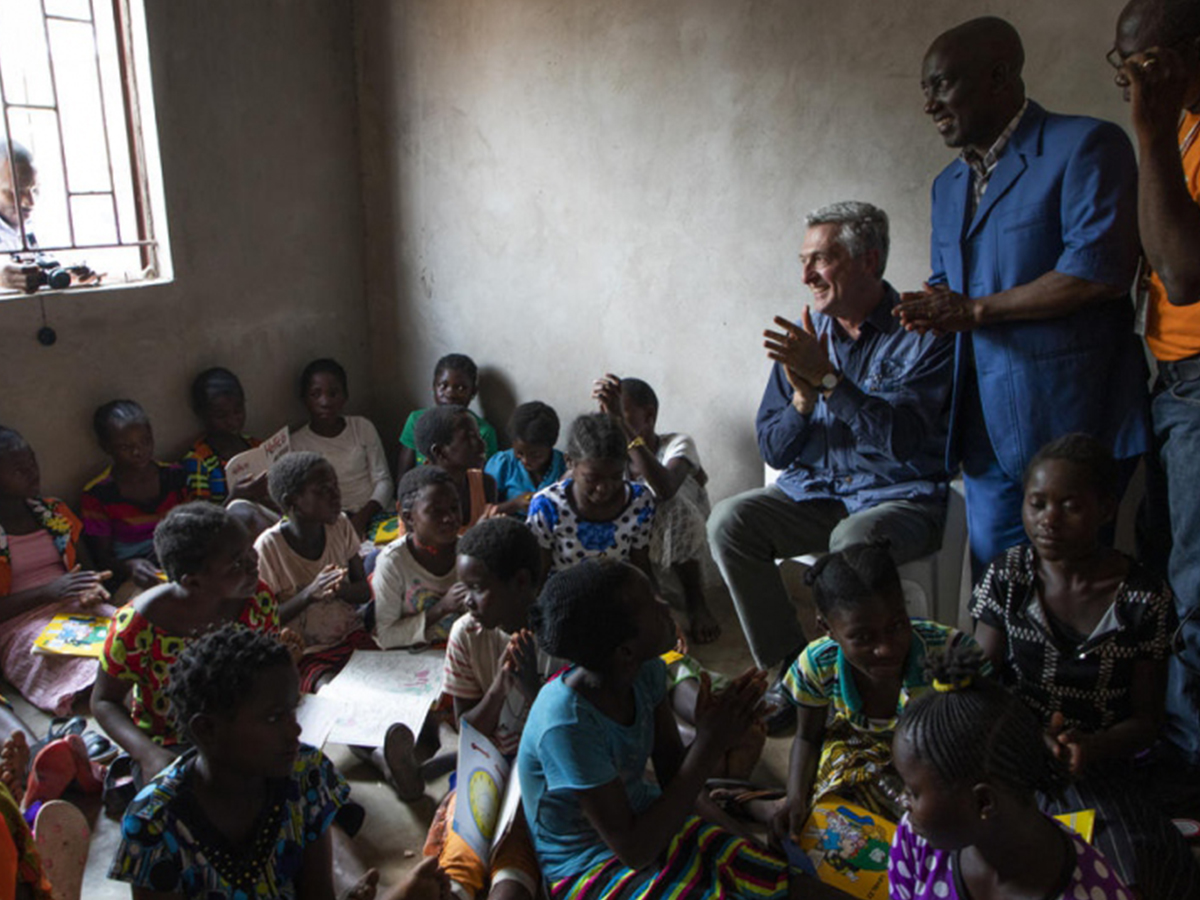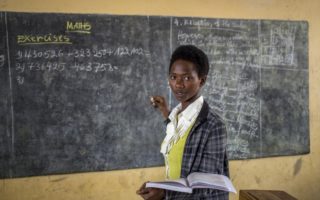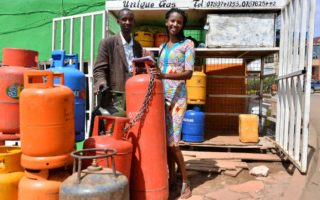
UN High Commissioner for Refugees Filippo Grandi meets with Congolese refugees at a safe space for girls at Mantapala settlement, Zambia.
© UNHCR/Will Swanson
Filippo Grandi commends the African nation for its generosity towards refugees and calls for additional humanitarian and development support during a two-day visit.
UN High Commissioner for Refugees Filippo Grandi called for additional humanitarian and development support for Zambia, where he witnessed first hand the country’s progressive policies on refugee integration during a two-day visit.
“We will continue to invest in the emergency short term response, but this needs to be accompanied by longer term international support that will allow refugees and the local communities to benefit from economic opportunities, and boost local infrastructure and services,” said Grandi, who met government leaders, partner agencies, donors, refugees and their hosting communities during his mission which concluded on Friday.
While in the capital, Lusaka, the High Commissioner met with President Edgar Chagwa Lungu and reaffirmed UNHCR, the UN Refugee Agency’s commitment to advocate for additional resources to support the country’s refugee response.
Grandi noted that in embracing the comprehensive refugee response model put forward by the Global Compact on Refugees, Zambia has demonstrated true solidarity with people forced to flee conflict, war and persecution. He specifically thanked the President and the Zambian people for the strides made towards the local integration of former Angolan and Rwandan refugees.
“The people of Zambia are very peaceful and generous.”
The Refugee Chief also spoke at the Fifth Conference of African Ministers Responsible for Civil Registration, about the importance of documentation and registration of refugees and asylum seekers and the fight to end statelessness, particularly at a time when the world is witnessing growing levels of displacement.
Grandi highlighted pledges to curb statelessness made by states at UNHCR’s annual Executive Committee gathering in Geneva earlier this month.
“Twenty African states, including Zambia, have made pledges related to improving birth registration systems. I think that we are moving in the right direction and I hope that this conference will be an opportunity to discuss more how to make those pledges a reality,” he added.
Grandi joined stakeholders from the Government, donor countries, UN agencies, NGO partners and refugees at a forum where they discussed the implementation of the Global Compact on Refugees, a framework adopted by the UN General Assembly last year, which seeks more predictable and equitable sharing of responsibility.
Hassan Abdi, an urban refugee who attended the forum, shared his experience of living in the capital, which he has called home for nearly 30 years.
“I left Somalia because it was not safe. I found an opportunity here and I have been happy. I don’t regret coming to Zambia,” said Hassan, 58, who fled in 1990.
The father of eight operates several businesses in the outskirts of Lusaka, ranging from a car wash and transport services to a bakery and a restaurant, and has employed 15 Zambians. He credits the country’s conducive and peaceful environment for his success in business as he was able to apply for a permit that allows him to trade in the city.
“The people of Zambia are very peaceful and generous. This is what has made it possible for me to do business here,” he explained. “I am an employer and I pay taxes and it feels good to be able to contribute to this country.”
Hassan believes that with continued support and improved documentation, he and other refugees could do more.
Prior to visiting Zambia, Grandi spent two days in South Africa where he expressed support for the government and refugees.
During a visit to Mantapala a refugee settlement in the north of Zambia, the High Commissioner met with refugees and their Zambian hosts and visited some of the facilities that they share, including a health clinic, a primary school, a market and a safe space for girls and women.
“We should never forget that when refugees come to a country like Zambia, the first impact is on the local community,” he said.
At the market, he spoke with several traders who shared their experience of working and living side by side.
Mukea Chungu, a trader from Pweto town in the Democratic Republic of the Congo’s Katanga province, runs a small grocery in the market, where she sells tomatoes, onions and other fresh produce. She started the business with capital received though UNHCR’s livelihood programme.
“I would want the help I was given to be extended to more people.”
“My life is good now because of the assistance I received. I can buy clothes for my children and pay fees,” added Mukea, who makes 200 Zambian Kwacha (about US$20) per day. “I would want the help I was given to be extended to more people.”
A few meters from her stall is a small, tidy restaurant owned by Jane, a Zambian. She started the restaurant last January, with the arrival of the Congolese refugees.
“When I saw refugees coming here, I identified a space in the market for a restaurant because no one else was doing this business,” she said. “I wouldn’t have managed to set it up if they were not here because I wouldn’t have customers.”
Zambia currently hosts over 84,000 refugees and asylum seekers in Meheba, Mayukwayukwa and Mantapala settlements, as well as urban refugees in Lusaka. Most are from the Democratic Republic of the Congo, Angola, Rwanda, Burundi and Somalia.
Economic inclusion of refugees will be one of the topics under discussion at the Global Refugee Forum, a high-level meeting to be held in Geneva later this year. States, the private sector and other actors will announce high-impact contributions that will give refugees a chance to use and further develop their skills and contribute to economic growth in their host communities.
Originally published by UNHCR on 19 October 2019





